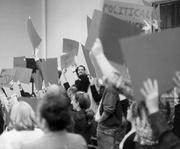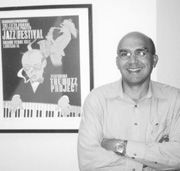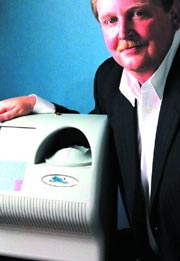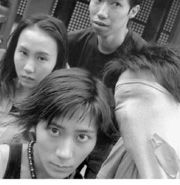INSTITUTIONS OF HIGHER learning deal with paradoxes every day—whether it’s a physics teacher saying that light is both a wave and a particle or an English prof preaching the death of the author. But the administration at the University of Washington is having a hard time swallowing a simpler claim that their graduate student TAs (or teaching assistants) are both students and workers. And they wish to represent themselves as a union.
The administration has refused to recognize the Graduate Student Employee Action Committee—affiliated with the United Auto Workers—even after more than 80 percent of the 1,600 graduate assistants signed union cards last spring. UW president Richard McCormick has repeatedly stated that graduate assistants are primarily students and any work they do is a part of their training. The TAs argue that their labor is vital to the functioning of the university. And they may soon get a chance to prove their point: Last week, the grad students voted overwhelmingly to authorize a strike if the UW continues to ignore their demands.
The concerns of the grad students vary. Some complain that they have nowhere to turn when professors dole out workloads well beyond the stipulated 20 hours. Others, especially those with families, worry about the gradual rolling back of health benefits.
“The unifying theme is collective bargaining—it’s just a legal voice that people want,” says Melissa Meade, a graduate student and teaching assistant in the Communications Department. “The issues range considerably. Those will come to the table when we actually start negotiating.”
Meanwhile, the undergraduates look on, wondering if they’ll get an unexpected vacation. If the graduate students call a strike this quarter, which is almost over, could that mean a cancellation of final exams? Some students, surely, are thrilled at the prospect.
McCormick, who could not be reached for comment, published a letter last week in the student newspaper, The Daily, warning: “Should graduate teaching assistants decide not to fulfill their teaching and grading responsibilities, the university would have to decide upon appropriate responses.” However, that vague threat failed to keep the grad students away from the voting boxes last week.
The union has proceeded with confidence, bolstered by an October 24 rally, at which King County and Washington state labor leaders promised to support the student-workers to the end—both joining the students on the picket lines and raising a strike fund to alleviate any loss of stipend. Even AFL-CIO President John Sweeney stopped by. In addition to plugging Al Gore, he accused the university administration of ignoring democracy and taking the “low road.”
Unlike California, where UAW lawyers battled in courts for years to allow legal recognition of graduate student unions at the public U Cal system, there is no legal impediment in Washington state to the administration’s recognizing a union. On the other hand, the university also has no legal obligation to do so.
The UAW has been aggressively campaigning to organize graduate students throughout the ’90s. At this point, 27 public universities have unionized teaching assistants. Their cause scored another victory last week when the National Labor Relations Board decided that graduate assistants at private universities have a legal right to form unions, as well.
The UAW will reap benefits, most directly by way of dues from all their unionized students. But more significantly, it is fostering a labor consciousness in a set of people who are almost sure to either teach or enter some other white-collar profession. Unions are eager to gain more of a foothold in these less unionized environments, especially the high-tech world, because the most important rule of collective bargaining has always been the more people who do it, the better it works.








